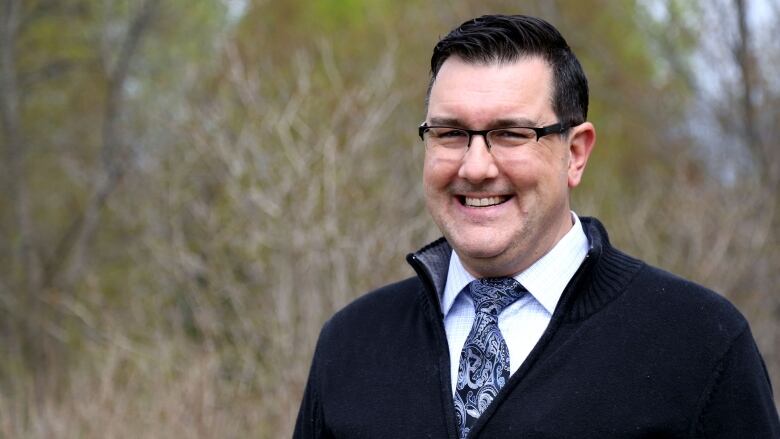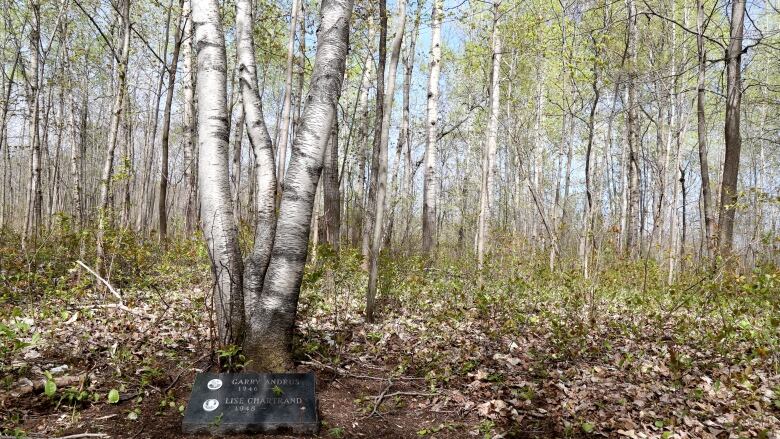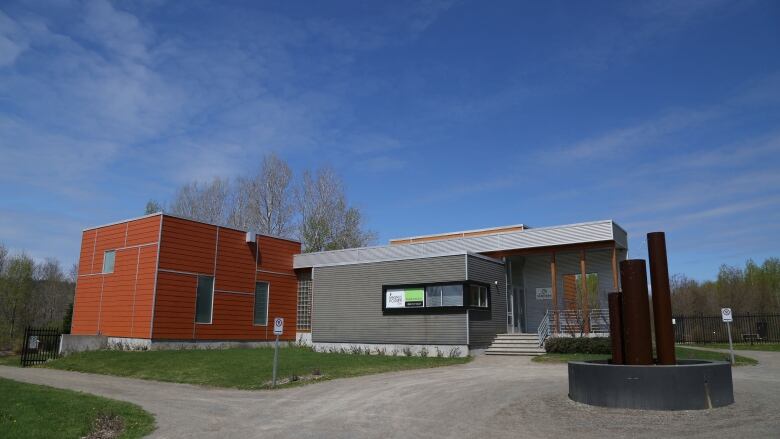Urns-only 'natural cemetery' a Laurentians success story
Cemetery in Prvost breaks with tradition, with no standing tombstones and gravesites scattered in nature
Strolling through Les Sentiers natural cemetery feels more like a walk in a wooded park along a river than going to a cemetery.
Visitors who walk down the quiet, crushed stone paths will notice black granite bevels at the foot of trees or in grassy field. The flat, elevated, placemat-sized stones mark gravesites. Each bevel is identical in shape and composition.
- Green cemetery on Denman Island is Canada's first
- Green' burials offer environmentally conscious alternative
"Everybody is equal here," says co-founder and co-owner John Tittel. "Nature is omnipresent. It's part of everything, and we wanted to make sure that's what stayed at the forefront of everything."
Tittel says the most opulent family plots at the cemetery include a natural stone engraved with a family name and, perhaps, some special landscaping.
He says the only religious symbols on the site are on the headstones of individuals.
The cemetery is divided into sections which include a deciduous forest, the riverside, a grassy field and both indoor and outdoor columbariums.
A natural cemetery
The "natural cemetery" designation comes from the spot's natural setting which includes landscaping with plants that are native to the region and natural treatments for lawn and pond care.
Tittel says studies show burial and cremation equally impact the environment. One affects the soil and water tables, whereas the other creates emissions which affect air quality.

Before founding Les Sentiers, Tittel worked for two brothers who owned PSM, a company based in Saint-Jrme, which makes porcelain portraits for tombstones. His work allowed him to travel all across North America to meet people working in the funeral industry and to visit different kinds of cemeteries, including ones similar to the one he eventually co-founded.
"Everybody was talking about the 'greening of the funeral industry,'" he said, adding that one day he and the people he went on to found the company with decided, "We have a pretty good idea of how to do this. Why don't we give it a try?"
That was 2006. The cemetery opened in 2009.
"The first thing we told ourselves is that if this was going to have any type of success we would have to be the first," Tittel said.
An appealing alternative
Garry Andrus and his wife Lise Chartrand decided to make their funeral arrangements after he was diagnosed and treated for prostate cancer.
- 'Corporatization' of funeral industry drives quest for alternatives
- GPS replaces headstones in Calgary cemeteries
He said it was important to them to choose their final resting spot themselves and to take the mystery of what they wanted out of the decisions their children would have to make. He said they discovered Les Sentiers one day when they drove past it on Highway 117.
"It appealed to us because of the natural environment. We were pleased with the atmosphere as we moved from one place to another," he said.

Eventually they chose a spot at the foot of two birch trees and urns made using sand from the Magdalen Islands.
Andrus says he often felt traditional cemeteries were not designed with urns and cremation in mind, and he likes that Les Sentiers is designed specificallyfor ashes.
Jacques D'Anjou's father is buried at Les Sentiers. D'Anjousaid his father would often head out to a cabin deep in the woods, alone, for weeks at a time. So for his final resting place to be so close to nature was fitting.
As was the cemetery's religious philosophy.
"My father was a spiritual man but not in the traditional religious [sense]," D'Anjou said. "You can have people of all faiths in here, and I think represents more my father."
Business
Tittel says his company has "gone farther" than he would ever have thought because the major Montreal-based funeral company Magnus-Poirier approached them to partner a few years ago. He says he still has to work 80 to 100 hour weeks, but the company is making ends meet, and he's hopeful he'll be able to take a vacation soon.

"When it comes to a cemetery I don't think the expression "flocking to" is one I would use, however, in cemetery circles we are told our occupation rate is climbing at a very, very fast pace," says Tittel.
Tittel says the ashes of about 300 people have been buried or placed in columbariums in the seven years the cemetery has been open. He says there is room for tens of thousands more.












_(720p).jpg)


 OFFICIAL HD MUSIC VIDEO.jpg)
.jpg)



























































































